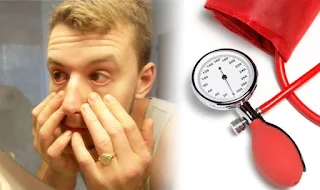9 Dangerous Signs And Symptoms Of High Blood Pressure That You Should Not Ignore
The body customizes itself to control the usual pressure in the body. The healthy arteries dilate to allow more flow of blood. The heart may beat more than usual to allow the efficient flow of blood.
A steep high in BP can have detrimental effects on the body. High blood pressure is associated with various heart problems such as hardening of the arteries, enlarged heart, kidney damage, and eye damage.
ALSO READ: Home Remedy For Low Blood Pressure
Signs And Symptoms Of High Blood Pressure
1. Severe Headache:
Headaches are quite common in a few people that can be due to sinus, migraine or other histories that go away with pain medications. But headaches due to high blood pressure will not go away with the use of over-the-counter painkillers.
A raised blood pressure may indicate a hypertensive crisis. It is a medical emergency when the blood pressure shoots to 180/110 mm Hg or higher. (How To Treat Headache Naturally at Home)
2. Fatigue and Confusion:
People suffering from heart disease will face extreme exhaustion. Even performing day-to-day activities will become a task. People will feel aches and pains while doing even small household chores.
The continuously raised blood pressure increases the risk of stroke, producing dizziness and confusion. It should be dealt with promptly as increases the risks of falls and accidents.
RELATED: Foods That Lower Blood Pressure
3. Vision Problems:
People with high blood pressure develop blood spots in the eye tissue. There will be a blockage of clear vision due to dark sports. High blood pressure causes dizziness and vision irregularities.
It can also damage the optic nerves and can cause permanent loss of eyesight.
4. Chest Pain:
People often mislead chest pain to acidity and indigestion. This chest pain may subside, but the other concerns of chest pain should not be ignored such as high blood pressure and heart attack.
The pain and pressure in the heart radiate towards the upper arms and extends to the jaw. People might complain of jaw pain, but in reality, it will be pressure from the heart due to hypertension or heart attack.
5. Difficulty Breathing:
The heart and lungs work in coordination with each other to supply oxygen to the body. Any impairment in functioning can cause difficulty in breathing. The lungs may get filled with water making it difficult to pump the oxygen as required.
The heart works harder to pump blood to the lungs and it can even result in damage to small blood vessels. Damage to blood vessels means there will not be any supply of oxygen which can further worsen the situation. There will be a reduced flow of blood. Breathing difficulties should be addressed as soon as possible.
6. Irregular Heartbeat:
The heart usually pumps more than normal when you exercise. The temporary mechanical load does not have a long-lasting effect. But when people are often experiencing high blood pressure then the heart will not be able to handle this mechanical overload.
The contraction and relaxation of the heart muscles are controlled by calcium ions, but in conditions of stress, the calcium control system is unbalanced resulting in arrhythmia. Irregular heartbeats should be taken seriously to avoid any potential damage to the heart.
7. Hematuria or Blood in the Urine:
It is common in people who have high blood pressure. The urine can turn brownish-red, pink, red, or tea-colored. One might not see the red blood cells directly in the blood as it requires laboratory examination to confirm the presence of RBC.
Such patients should avoid taking anti-inflammatory medicines as it increases the risk of bleeding for a long duration. Hematuria can also be due to kidney infection, kidney stones, glomerulonephritis, enlarged prostate, kidney disease, etc.
8. Pounding in your Chest, Neck, or Ears:
Pulsing in the ears or rushing of blood in the neck can happen even when you are at rest; this might be an indication of increased blood pressure. The carotid arteries present in the head and neck produce these strange feelings when the blood flow is not normal.
The pounding can also be due to increased intake of caffeine, maybe in the form of coffee or soda. Caffeine is known to induce anxiety and can cause a pounding sensation.
READ MORE: How To Relieve Chest Pains Using Herbs
9. Nose Bleeds:
The raised blood pressure hemorrhage and anxiety lead to nose bleed in hypertensive patients. People suffering from Epistaxis (nose bleeds) mostly have high blood pressure.
If there is a frequent recurrence of nosebleeds, then the chances of high blood pressure cannot be ruled out. The occurrence of nose bleeds need not be necessarily due to blood pressure it can also be due to seasonal allergies, irritation of nasal mucosa, or dryness of nasal mucosa.
Blood thinners can worsen the situation with excessive bleeding. It is important to consult the doctor as soon as possible.
Conclusion:
Headaches, nosebleeds, decreased vision, dizziness, and confusion should be considered as an indication of high blood pressure in people with a history of hypertension. Palpitations and breathing difficulties are an indication of anxiety that can lead to high blood pressure.
In hypertension, your heartbeats increase more than normal that can be felt in the ears and neck. One should take care of these alarming symbols of high blood pressure and make a note that these symptoms can indicate another underlying disease.
Adequate measures should be taken to control high blood pressure as it increases the risk of heart diseases such as heart attacks, heart failure, and kidney disease.
Lifestyle changes can be very helpful in controlling blood pressure and also the prevention of heart diseases. Moderate exercise, reduce intake of salt and alcohol, weight loss can help you to control blood pressure.
Source: righthomeremedies.com












